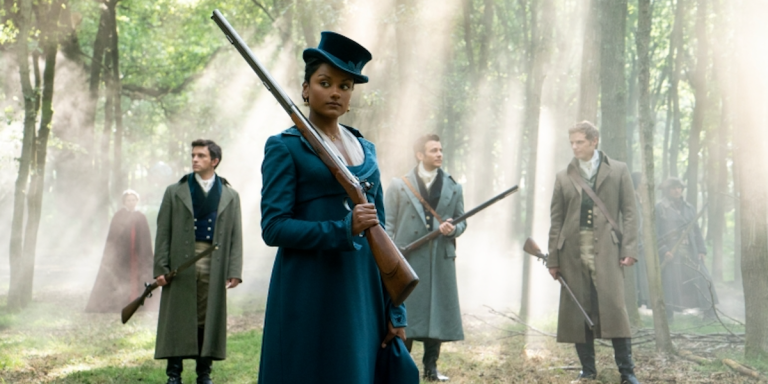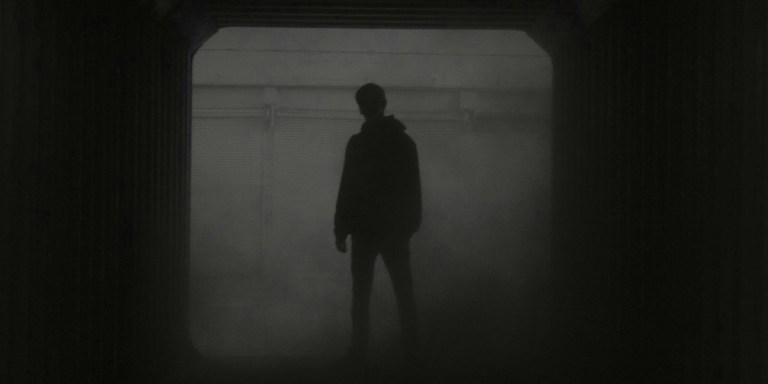Netflix’s Luckiest Girl Alive Delivers a Sensitive Adaptation of Jessica Knoll’s Novel

When Ani Fanelli (Mila Kunis) uses the title phrase to refer to herself in Luckiest Girl Alive, she does it with a sense of bitter irony. She says those words as she’s talking to documentary filmmaker Aaron Wickersham (Dalmar Abuzeid), who’s been pursuing her for months to get her to go on record about horrible experiences from her teenage years. Ani survived a school shooting and multiple sexual assaults, and she puts on a confident front every day to distract from her unresolved trauma and rage. If this is what luck looks like, it doesn’t seem like something anyone would wish for.
When the title flashes onscreen at the end of the movie, though, it’s more of a triumph, and the evolution between those two moments is what makes Luckiest Girl Alive fascinating to watch. Adapted by Jessica Knoll from her own 2015 novel, it’s been compared to hit literary thrillers like Gone Girl and The Girl on the Train, but despite its similarly worded title, Luckiest Girl Alive isn’t the same kind of mystery.
Some of what happened to Ani as a teenager is revealed slowly over the course of the movie, but there are no shocking twists or bombshell revelations. Luckiest Girl Alive is set partially during Ani’s tumultuous first year at an upscale private school, which she attends on a writing scholarship. Teenage Ani (Cruel Summer’s Chiara Aurelia) gets caught up with a group of wealthy, popular students, who bully her even as they make themselves out to be her friends.
The specter of the forthcoming school shooting hangs over those flashback scenes, but the present-day story (set in 2015) doesn’t deal with any looming violence. Instead, adult Ani’s conflict is mostly internal, coming to terms with how her choices have been shaped by the devastating experiences of her youth. She’s made herself over into a New York City power player, with a job at a popular women’s magazine and a fiancé from an old-money family. She’s fanatical about her exercise and eating habits so that she can fit a very specific image of a successful woman that she formed when she was younger.
As the movie begins, Ani is just weeks away from getting married to Luke Harrison (Finn Wittrock), a well-meaning but ultra-privileged finance bro who’s partially aware of Ani’s past but doesn’t truly know or understand her. Luke isn’t a villain, certainly not like the boys Ani went to school with, but he’s not right for her, and it takes re-examining the horrors of her past for Ani to understand that.
Kunis, who’s still mostly known for comedy, perfectly balances Ani’s sarcastic sharp edges and her deep sadness, and Knoll uses extensive voiceover to contrast between what Ani’s thinking and what she shares with other people. Mike Barker’s direction is mostly straightforward, but he sometimes evocatively blends past and present, especially in an effective scene of adult Ani driving by a church where she sees her younger self attending the funeral of one of her classmates.
Luckiest Girl Alive doesn’t build to the kind of explosive climax that audiences may expect from those Gone Girl comparisons, although Ani gets a satisfying confrontation with one of her past tormentors. It’s an empowering story not because Ani defeats her enemies, but because she faces the things that scare her the most and is honest with the people in her life, including her judgmental mother Dina (Connie Britton). The lies that Ani uncovers are mostly the lies that she tells herself, and if her final triumph is a little cheesy, she’s done more than enough to earn it.
Discover the Book
As a teenager at the prestigious Bradley School, Ani FaNelli endured a shocking, public humiliation that left her desperate to reinvent herself. Now, with a glamorous job, expensive wardrobe, and handsome blue blood fiancé, she’s this close to living the perfect life she’s worked so hard to achieve.
But Ani has a secret.
There’s something else buried in her past that still haunts her, something private and painful that threatens to bubble to the surface and destroy everything.
With a singular voice and twists you won’t see coming, Luckiest Girl Alive explores the unbearable pressure that so many women feel to “have it all” and introduces a heroine whose sharp edges and cutthroat ambition have been protecting a scandalous truth, and a heart that's bigger than it first appears.
The question remains: will breaking her silence destroy all that she has worked for—or, will it at long last, set Ani free?
By clicking 'Sign Up,' I acknowledge that I have read and agree to Hachette Book Group’s Privacy Policy and Terms of Use
What to Read Next
Josh Bell is a freelance writer and movie/TV critic based in Las Vegas. He’s the former film editor of Las Vegas Weekly and the former TV comedies guide for About.com. He has written about movies, TV, and pop culture for Vulture, Polygon, CBR, Inverse, Crooked Marquee, and more. With comedian Jason Harris, he co-hosts the podcast Awesome Movie Year.



